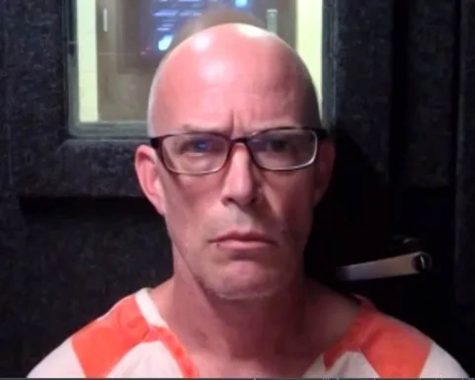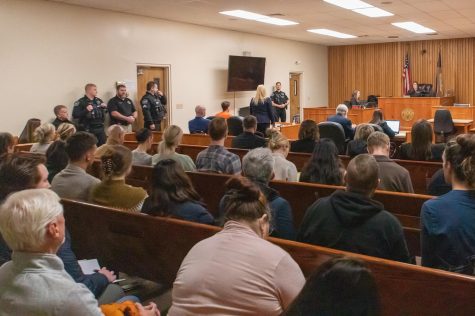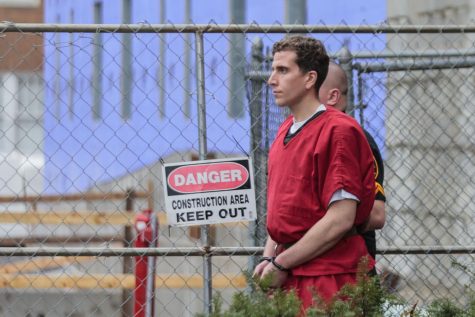WSU offers resources for sexual assault victims
November 15, 2013
The first time Nikki Finnestead heard a friend of hers had been raped, she responded by saying, “Why were you drinking so much? Why were you hanging out with that guy? I told you that was a bad idea.”
Finnestead, the violence prevention coordinator with Health and Wellness Services at WSU, now looks back on the incident and wishes she could change what she said. She didn’t realize at the time how harmful words like that can be to a victim of sexual assault, she said. But she said she learned a lot from that experience, and she now spends her life speaking against sexual assault and other forms of violence.
The issue of sexual assault and sexual misconduct is prevalent and dangerous, and it’s one of the most underreported violent crimes, Finnestead and other experts said.
Sexual misconduct is not a sex act, but a violent crime that is historically underreported to the police, said Tamara Jell, coordinator of sexual assault services for Alternatives to Violence of the Palouse (ATVP).
Adam Jussel, director of Student Standards and Accountability, described sexual assault as nonconsensual sexual touching of any kind – any sexual activity with another person, including physical contact, that was not discussed and agreed to.
This statement was echoed by Finnestead. The issue of what constitutes consent was a serious one in the conversation about preventing sexual assault.
“The absence of no does not mean yes,” Finnestead said.
Cmdr Chris Tennant of the Pullman Police Department said miscommunications about whether consent was given or not are common leading to a sexual assault, and those ‘misunderstandings’ are often intentional. He said perpetrators often know they do not have the other’s consent.
Christine Wall, ATVP executive director, said, “More often than not, this is a predatory crime and not a miscommunication.”
Alcohol can play a role in making those lines hazy. People incapacitated from alcohol cannot legally give consent, WSU Police Department Assistant Chief Steve Hansen said.
The vast majority of sexual assaults, more than 80 percent, are acquaintance rapes. That is, the victim knew the perpetrator before the assault took place, Jell said.
Jell said society asks the wrong questions about sexual assault. Asking what the victim did wrong to bring a crime like this on rather than asking why the perpetrator assaulted the victim, Jell said.
Just because people are in a position to be victimized does not make a sexual assault the victim’s fault, Hansen said.
THE RESOURCES – CONFIDENTIAL
After a sexual assault, the victim is in a traumatized state of mind and has some big decisions that must be made immediately, Hansen said. WSU and the greater Pullman community offer resources to students to help with the decision.
Finnestead’s office, located beneath Health and Wellness, exists to show students all their resources and allow them to choose which one will benefit them the most, she said.
“We really want to see ourselves as a clearinghouse of information since we really don’t provide direct services to students,” she said.
There are both confidential and non-confidential resources depending on what the victim wants to do about the issue, she said.
Alternatives to Violence of the Palouse is one resource that is available to students on campus as well as off-campus community members. ATVP is a confidential resource and enjoys the same confidentiality standing with the state as counselors and clergy. ATVP is available to assist students with any concerns they might have about violence, and a student’s identification is not required.
“What that means is that we’re available 24 hours to provide crisis intervention, emotional support, emergency advocacy,” Wall said.
The emergency advocacy means meeting victims at the hospital and helping them through the process there, Jell said. ATVP advocates will outline victims’ options and help victims decide if they want to get a forensic exam or make a report, she said.
“When we’re there, we really try to help them with the experience because it’s very daunting and it can be very invasive,” Jell said.
Victims can get the forensic test without making a report, Jell said.
Tennant said there were two such exams in evidence at the Pullman Police Department, but both were submitted anonymously. The benefit to this is giving victims physical evidence if they decide they want to report the crime in the future.
Another confidential resource is Counseling and Testing Services. As doctors and psychologists, their help is available free for all students and is confidential.
The focus of Counseling and Testing Services is to provide help immediately after a sexual assault by providing resources and letting victims know their options.
The services include helping the victim make a police report, or filing a complaint to Student Standards and Accountability, as well as follow-up counseling, according to a document produced by Counseling and Testing Services.
“Students can go and talk to care providers in those offices without triggering a reporting obligation,” said Kim Anderson, executive director of the Office of Equal Opportunity.
Health and Wellness Services clinicians can also provide confidential support and medical care. HWS also is equipped to perform the forensic test and will not release the information about the patient under patient confidentiality laws like HIPAA.
THE RESOURCES- NON–CONFIDENTIAL
For students who wish to report the crime or talk to non-confidential resources, there are many of those on campus as well.
Crimes of this nature may be reported by concerned individuals or the students themselves to the Dean of Students Melynda Huskey. She will work with students to make sure they are aware of all their options and help them through the process with whatever path they decide to take.
“The first principal of working with survivors of sexual assault is to provide them with as much autonomy and decision making power as you possibly can, to give them the opportunity to regain control after a significant loss of control,” Huskey said.
Huskey’s office also works to provide respondents, or those accused of sexual assault, with the proper resources for their position.
She also can work with students to arrange for them to miss classes or rearrange their rooming situation if it is likely they may come into contact with their assailant.
The WSU and Pullman police departments are both available at any time to assist victims who wish to report something that happened to them.
Hansen said reports can be made anonymously about crimes if a victim does not wish to be identified but still wants to report the assault, and he encourages victims to come forward to the police. Coming forward right away is best because if a victim decides at any point to move forward in an investigation, the information needed to do so is already available, he said.
The Office of Student Standards and Accountability is also a non-confidential resource open to students who wish to report the crime to the university. If a crime is non-anonymously reported, officials at the office will begin investigating it, Student Standards Director Jussel said.
The office works closely with the Office of Equal Opportunity, Jussel said. The two offices conduct the investigation and are at the top of the communication chain regarding the issue.
“It’s a lot of joining forces and sharing resources,” Anderson said. “Not one office can do everything.”
If a student came forward with a sexual assault complaint, Anderson and Jussel would talk to the student, called the complainant, about the process of following through with an investigation with the goal of getting as much information to the student as possible.
Anderson and Jussel would invite the student to share the story and then determine if an investigation was appropriate. The issue would be investigated, including talking to witnesses on both the complainant’s and the respondent’s sides.
Anderson’s office would then draft a memo of the facts. Jussel would review the information and determine if any conduct rules had been breached.
“Normally these cases end up being referred to a University Conduct Board,” Jussel said.
The impartial University Conduct Board is only utilized in the most serious cases because it is the only one with the power to suspend or expel, Huskey said.
“We think it’s more fair to all parties to have it heard by an impartial board,” Huskey said.
The offices also will connect both the students involved with appropriate resources, including confidential and non-confidential.
“We will relay that information to both parties involved, so that way it’s equitable on both sides,” Jussel said. “We don’t have a predetermined outcome in this situation, we are impartial investigators. The part of the process is to be fair and equitable.”
A punishment for sexual assault through the university, depending on the extent of the assault, could be anything from an educational project to expulsion. These actions are separate from any judicial consequences.
Jussel said a student has been expelled for sexual assault crimes this semester.
Students can also report sexual assault crimes to faculty and staff, including resident advisers. However, they are non-confidential resources and can notify the appropriate authorities.
“We want to be very clear with the residents that it can’t remain confidential if they tell a Residence Life staff member,” said Edwin Hamada, associate director of Residence Life.
Hamada said that while resident advisers (RA) are in place to support students, it is mandatory that these confidentiality rules are in place in order to maintain a safe academic environment.
If a student were to come to a Resident Life staff member explaining that they have an issue, staff members make sure to let the student know what their confidentiality rights are, and then let the student decide if they want to continue, Hamada said. From there, staff members will most likely offer students other confidential resources that they can utilize.
RAs who learn about a sexual assault will report it to the hall’s Residential Education Director, who will in turn report it to Residence Life central staff, who will take the issue to Jussel and Anderson, Jussel said.
REPORTING THE VIOLENCE
Multiple avenues for victims to make formal reports against their assailant are available at both police departments in the city, which are both qualified to investigate the crime.
“We prefer that they’re reported rather quickly so there’s still evidence to gather,” Tennant said. “If they are reported in a timely manner, the first main concern is for the medical wellbeing of the victim. So we encourage them to either go to the doctor or the hospital as soon as possible and the physician will perform a rape kit examination.”
The physical evidence obtained from the forensic test is helpful in investigating the case because most sexual assault suspects deny having sex, Tennant said.
Without physical evidence, it often comes down to ‘he said, she said,’ Tennant said. While the police may believe the victim, in order to prosecute the police department must convince a jury of the assault.
Hansen said he often looks for additional evidence in a victim’s room or obtains a warrant to search the perpetrator’s room if the crime took place in either of those places.
However, a crime often is reported to the police months or years after the fact, Wall said.
A victim may not be ready to talk about it to the police at that time, or it may be that the victim tried to move on without really addressing it.
Chris Morgan, senior pre-law and political science major, said that the police often are working on a tight time frame with sexual assault situations and evidence is time-sensitive.
Wynn Mosman, a licensed attorney, offers free legal advice to students through Student Legal Services and suggested anyone considering pursuing an issue such as sexual assault meet with an attorney to discuss possible options.
“There’s always the concern of a victim being re-victimized if their accusations are not handled properly,” Mosman said.
Mosman said all reports of sexual assault can go through the county’s prosecutor’s office, where evidence will be further investigated and potentially move forward from there.
In this situation, the case will be the state versus the accused, Mosman said.
Most prosecutor’s offices have a victim witness coordinator whose specific job is to inform victims of the process after it has begun as well as provide further resources, Mosman said.
Students can also report to the university, which investigates in a completely separate process than the criminal one. Jussel said the process is usually quicker because they only have to prove the crime is more likely than not as opposed to a prosecution, which must prove it beyond a reasonable doubt.


















